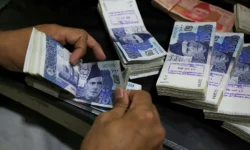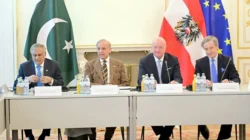PAKISTAN’S PROGRESSIVE JOURNEY HAS PUT IT FAR AHEAD FROM BEING A FRAGILE STATE

Demonstrators wave flags during a protest march for government reform led by Pakistani preacher Tahir-ul-Qadri, in Islamabad, Pakistan, Jan. 14, 2013. Qadri, who has recently returned to Pakistan after living in Canada, has taken the country by storm in recent weeks in a campaign against government corruption that has gripped the news media and jolted the traditional political mainstream. (Diego Ibarra Sanchez/The New York Times)
Pakistan’s ongoing journey towards development is an inspiring journey of overcoming
challenges posed in its way. It is the only country that has been consistently fighting
against the menace of terrorism for more than two decades. This war has made
Pakistan to lose more than 71,000 lives and inflicted an economic damage beyond
count. The resurgence of terrorism in Pakistan, after 2020, has proved detrimental for
the stability of the country. Along with other added factors, such as economic upheaval
due to COVID-19, Pakistan lost several points on Fragility State Index as per the report
of 2023. After this report, the leadership of Pakistan has worked creatively in mitigating
with these challenges, from which one can be sure that in next report Pakistan will no
longer be lower in Fragile State Index Ranking, rather it would perform extra-ordinary
as it did in second last decade.
The Fragile State Index is based on hundreds of articles and publications that are
analyzed by their CAST Software from electronically accessible sources, with an
emphasis on risk indicators. Metrics of fragility, such as Refugees, IDPs, Demographic
Pressures, and so forth, are ranked from 0 to 10, with 10 being the highest level of
fragility and 0 representing the lowest. Pakistan’s fragile states index in 2023 was 89.9.
Its fragile states rating decreased from 104.1 in 2009 to 89.9 in 2023.
Considering demographic pressures, Pakistan has improved its security conditions
prevailing in the country. It has put a strong resolve to curb terrorist outfits enjoying
safe heavens in Afghanistan whilst conducting IBOs at border region. After Pakistan
took a number of actions in October of last year to stop the misuse of Afghan Transit
Trade, the government is planning to have a new bilateral trade agreements. Pakistan
was not happy with the Taliban government for its unwillingness to act against the
banned TTP and its affiliates. Moreover, Pakistan has managed its porous border with
Afghanistan by fencing it as this porous border was the main passage from where
terrorist sneaked into Pakistan and carry out heinous acts of terrorism.
The second indicator that on which countries are ranked on Fragile State Index is the
issue of IDP’s and refugees. Around 4 million Afghan refugees were residing in
Pakistan, almost half of them were living as undocumented citizens. The Government
of Pakistan had made a decision, in 2023, to send illegal Afghan Refugees back to
their country. The major reason for this bold move was that illegal Afghan refugees
were involved in various sort of crimes in Pakistan, ranging from drug trafficking to
terrorism. The second phase of the undocumented Afghani citizens’ return will shortly
begin in Pakistan. The Interior Ministry had previously instructed police and district
authorities to speed up the mapping and data collection of the whereabouts of Afghan
Citizen Card (ACC) holders, with a deadline of Monday, March 25, for the completion
of the process. This action will not only improve the security conditions, rather it will
also have a positive effect on the social fabric of Pakistan.
On administrative indicators of FSI, it is noteworthy that the present government in
Pakistan is a coalition government. This government is backed by various political
parties, where PML-N and PPP present a strong nexus. Both parties’ heads are
stalwart in dealing with challenges as they are seasoned politicians and
administrators. Furthermore, they are more democratic and equitable since they
reflect a larger variety of viewpoints and a wider spectrum of people. The opportunity
to be represented in government is provided by a coalition government for members
of other parties. A coalition government also benefits from a greater diversity of
perspectives, which increases the likelihood of policy debate and consideration of
other viewpoints prior to implementation. The reason that this form of government
tends to represent a larger range of opinions and lowers the likelihood of hostile politics
forming, it has easier administrative continuity.
Examining the economy, the Pakistan Bureau of Statistics (PBS) reported that during
the second quarter of fiscal year 2023–24, which ran from October to December, the
country’s gross domestic product (GDP) increased by a meek 1%. According to the
National Agricultural Council, the agricultural sector has grown by 5.02% over the
same time last year. Along with emphasizing the value of helping the business
community and guaranteeing prompt tax returns, the Prime Minister also announced
that the Federal Board of Revenue (FBR) has cleared tax refunds of Rs 65 billion. The
SIFC is a driving force behind the government’s efforts to provide for the needs of the
people, as it is committed to investing $60 billion over the course of the next five years.
This council facilitates investments connected to agriculture, mining, information
technology, and defense. It has recently prepared to move forward with the idea of
creating a multibillion dollar semiconductor and chip design sector in
Pakistan. Moreover, Pakistan’s collaboration with Saudi oil company Cnergyico and
green initiative in agriculture are predicted to bring huge foreign direct investments in
the country.
The three major pillars of the state; executive, judiciary and legislature are working
in coherence. It leaves little space for any pillar to over exercise its powers and halt
the smooth running of government. False pretenses of institutional imbalances, spread
by few inimical elements, die out when a strong civil-military relation is prevailing with
practical manifestation. Furthermore, it also predicts justly that country is prepared to
fight any internal and external challenge posed in its way. It can be inferred by
analyzing the policies of the government that Pakistan in on the way to progress. No
challenge remains a stumbling stone in Pakistan’s pathway towards Progress, which
is a reflection that Pakistan is far ahead from being a fragile state.





